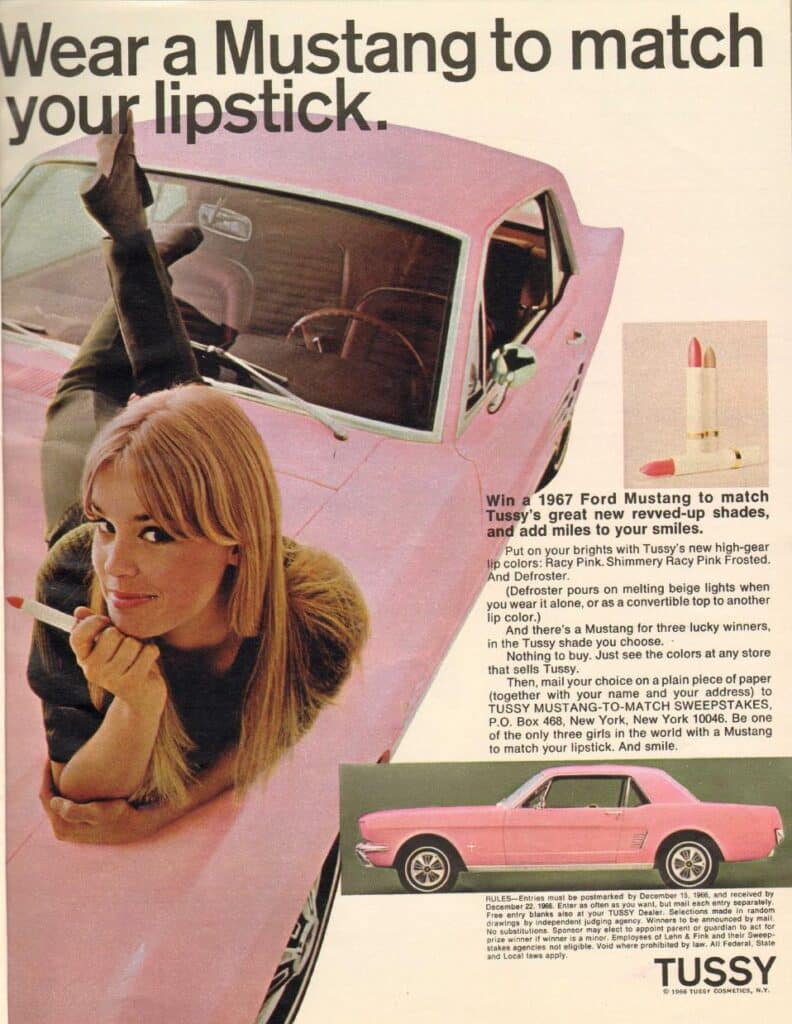This past week, we came together as a country to celebrate one of the most significant events in not only our collected history, but in the history of mankind (emphasis on the man): the 50th anniversary of the Ford Mustang. Look, let’s get one thing straight right off the not-at-all-phallic bat: the Mustang is the ultimate car for men. It is a take-no-prisoners, ask-no-questions, pedal-to-the-metal, four-on-the-floor, screaming-into-the-heavens and grabbing-your-junk-like-you’re-about-to-lose-it performance machine that may as well spew testosterone emissions from its not-at-all-phallic tailpipe.
The 2015 Ford Mustang: Because you are already incredibly well-endowed, but you just really like fast cars
It’s only appropriate then that scores of Mustang lovers no doubt spent the anniversary of the beloved beast by doing manly things such as participating in hour-long keg stands, holding loud public conversations about their every sexual conquest in the backseat of a Mustang, and slapping one another on the back while making engine noises with their mouths between sets of tricep pulldowns at the gym.
If you’re a women who loves the Mustang, well, Ford and OPI have come together to make you up some pretty nail polish. You know, because you’re a woman and you probably like that kind of thing.
HEY, YOU LIKE NAIL POLISH, RIGHT? OF COURSE YOU DO, YOU LADY!
Now I by no means am trying to suggest that Ford itself has a culture problem. They were recently named one of the world’s most ethical companies, they’ve done a great deal of business with women-owned suppliers, and their Warriors in Pink campaign has raised millions to help fight breast cancer. By all accounts, they’re an equal opportunity employer and I’m pretty sure they don’t give a rat’s ass who is buying their cars so long as they’re selling them in droves. They’re certainly not going to go the asinine route of Dr. Pepper and advertising their product as “not for women.”
Spoilers: it’s also not particularly tasty.
On Sexism in Car Commercials: This Is Way Bigger Than Ford and Some Nail Polish
The whole of automotive industry on the other hand? Well, that’s an entirely different story. While women have fought against the tides and climbed the ranks over the years, the business is still a male-dominated one (stop me if you’ve heard that one before). Just when you think things are about to change for the better, you soon realize that they were only allowed to change so that men didn’t have to eat a proverbial bullet. Women like Mary Barra are looked at as den mothers; maternal figures who have to strap on their Kevlar aprons and go clean up after the messes that others (mostly men) have made. At worst, they’re seen as second-class citizens who should always be about a half-step below their male counterparts.
MA! COME WASH ALL THE BLOOD OUT OF MY CLOTHES!
The automotive industry largely has no idea how to market their products toward women, which is why you see a number of advertisements repeating trends where: (1) women are objects that male car buyers want to accumulate; (2) women are accessories that make cars appear more attractive to male car shoppers; (3) women are seen as helpless and entirely unaware of how the entire car-buying experience works; (4) women serve the primary role of minivan-driving mothers.
And, of course, that charming old stereotype of women being simpletons.
Even when celebrities are called in for car adverts, the roles completely flip. Jeff Bridges lends his voice to Hyundai, John Cusak tells you all about why tofu can be damned for Chevrolet, Will Ferrell hams it up for the Dodge Durango to great effect, and Daniel Craig smolders behind the wheel of a Land Rover. And why not? They’re venerable men of the craft (well, Will Ferrell not so much). They are trying to sell you on a product with the appeal of their name and the respect it brings, and nobody has to get half-naked to do it (not counting Terry Crews, of course, but that man abhors shirts in the same way that your behind-the-curve Facebook friends hate Game of Thrones spoilers).
“YOU GO TO HELL, SHIRTS! MY ABS NEED ROOM TO BREATHE!”
What do women get? They get Brooklyn Decker running around in a bikini for Nissan and Kate Upton being objectified by a football team while the camera pores over every curve of her body and only occasionally glances at the Mercedes-Benz CLA. This is not advertising based on a name or even a modicum of respect. This is trying to get men to buy the car that is in the general area approximate to which Brooklyn Decker’s breasts are heaving.
The opening shot of the Kate Upton ad is as subtle as every gratuitous boob shot in every horror movie shower scene ever.
On the rare occasion when a woman is used to market a vehicle toward other women, the results aren’t much better. Take Kate Walsh’s 2008 ads for the Cadillac CTS. In one, she says that the actual functions and features of a luxury car are supplemental to the all-important question of whether your car arouses you sexually. The implication is that the CTS is essentially some kind of $50k, four-wheeled sex toy.
In another, she lists some of her favorite things (aka things that other women probably like according to the male ad mule who likely wrote the script): “Gossip magazines, dark chocolate, Italian shoes.” She adds that the best part of driving the CTS is “pulling up to the boys club in one of these.”
Ostensibly, women only drive $45,000 luxury sedans because they help earn them more attention from men and get them better ready for their sex. At least Kate Bush was fully clothed in this commercial. And, hey, she was driving the car, which is a hell of a step up from that old Cadillac ad that suggested women should only be passengers.
Please, come by your local dealership and spend an hour in the passenger seat of the 1969 Cadillac, but for the love of god, don’t you dare even think about driving it.
What Warthog? Hennessey Gives the Bronco the VelociRaptor Treatment
Who Eats Fish Sandwiches Like That? Seriously.
We all know that sex is a huge aspect of marketing products, even when it shouldn’t be. If anyone could properly explain to me why it’s necessary to shill fish sandwiches by having a bikini-clad model eat one in slow motion while arching her back in a not-at-all-suggestive manner, I sure would appreciate it. Never mind another brilliant Hardee’s ad that seems to suggest that a woman (even if it is a blue, shape-shifting mutant woman) can only properly enjoy one of their bacon-loaded burgers in the guise of a man. Because, you see, bacon is manly. So goddamn manly. If Dr. Pepper made bacon, they’d tell you that it’s not for women.
On the other hand, Jaguar’s “Good to be Bad” commercials for the F-Type are sexy. They are sexy because they’re cinematic and just so happen to feature one of the most dashing men alive (not to mention Ben Kingsley and Mark Strong, who are certifiably brilliant and sexy in their own right). Oh, and let’s not forget that the F-Type R Coupe is just kind of a badass car that could sell itself.
Like you need any more reasons to want to buy this thing, holy crap.
But Tom Hiddleston doesn’t have to go shirtless in order to ooze sex appeal (although I’m sure a great many wouldn’t mind it); he is as magnetic and attractive in a well-tailored suit as any half-naked fish-sandwich-eating model, and he actually gets to…you know…talk.
And when Hiddleston talks, it’s with the kind of charisma that forces you to keep your eyes on him on the big screen. Even if he’s never driven a Jaguar in his life, you believe him as the spokesman for the brand. More importantly, you want to drive that car, and not because it’s incredibly bad-ass (it is). You want to drive it because you want to be charismatic and powerful like the way Tom Hiddleston comes off.
This is advertising well done. It drips sex without even trying. It doesn’t come across as forced or sleazy. It just makes you want to drive a car.
It’s almost like you have a purpose for watching other than ogling!
Okay, You Can Keep Your Clothes On. Just, Ya Know, Touch It. Right There. That’s Good.
Since we’re talking about the Mustang (in some roundabout way), let’s make special mention of an ad for the 2015 incarnation that stars Sienna Miller. It premiered on the day when the world first laid eyes on the new Mustang as an effort to entice European pony car enthusiasts.
In the pantheon of sexist car ads, this isn’t the worst, but it’s still indicative of the larger problem. The whole spot is centered around how sensually Miller caresses every aspect of the car. It’s how she runs her fingers across the Mustang emblem in the steering wheel, how she takes the shifter into her hand, and how she presses herself out over the shark-bite nose.
In this ad, Miller isn’t using her agency as a BAFTA and Golden Globe-nominated actress. She’s an accessory to the vehicle. You are implored to buy the 2015 Mustang because it is the object of Sienna Miller’s affections, the recipient of her touch, and you should want to own this car because it will, by proxy, make you desirable in her eyes.
The Cryptography of Sexism in Marketing
Yesterday, I found myself looking over the press release for the OPI Ford Mustang nail lacquer collection and found a good deal of covertly diminutive language. Granted, there is nothing so bold in the press release that it screams sexist, but there are enough cues to see a pattern that’s existed for far longer than the iconic pony car.
One of the things that struck me as particularly off-putting thing about the press release for the OPI Ford Mustang collection of nail lacquers was not something said by a man, but rather this statement from OPI’s co-founder and executive vice president Suzi Weiss-Fischmann (emphasis mine):
“Nail color, just like the car she drives, is the ultimate expression of a woman’s personality,” says Weiss-Fischmann. “Automobiles are synonymous with style, and there is a special kind of love affair between a woman and her car.”
Like that one time Sherpa tried to tell women that their boobs were their best assets.
The implication that a woman’s personality could be summarized so simply by something as benign as the color of nail polish is ridiculous. Of course, there’s a lot that can be said here about the consumerist sentiment at work here—it’s all rather Fight Club-ian—but it’s hard to believe that someone with a brain in their head would legitimately try to sell a new line of, say, dress ties by telling their customers that the color tie they wear is the ultimate expression of their personality.
You are not your job. You are not the car you drive. You are not the color of your nail polish.
I’m sure it’s totally a coincidence that this is the part of the Mustang they chose to have this model touch.
I’m positive that Suzi Weiss-Fischmann worked extremely hard to get where she is in life. I can’t help but think that if someone told her that her personality is no more dynamic than the color of her nail polish, she’d probably be a little bit offended. She’d probably tell you that she’s more than a shade of red or blue or pink.
This, of course, runs totally counter to the statement that “A woman is multifaceted.” If a woman has so many roles to fulfill, so many obligations to herself and those around her, and so many different layers to her personality, then how do you reasonably suggest that something as frivolous as the color of her nail polish could sum her up so nicely in one big pink box?
That line about a woman being multifaceted? That’s part of the pitch for a shade of nail lacquer called “Girls Love Ponies.” The rest of the pitch? “[T]his grown-up pink acts as a reminder of her femininity, even as she takes to the wheel of the powerful pony.”
It’s still hard for me to properly wrap my head around all of the preposterous notions at play here. The fact that a woman should need reminding of her feminine identity, that she should particularly need reminding of her femininity when driving a Mustang (which we all know is a man’s car for men who also have penises), the fact that we still attribute pink as the ultimate aide-mémoire for the female zeitgeist, or the fact that we have to categorize this particular shade of pink as “grown-up” so as to separate it from all that other little girl pink nonsense.
You’re a girl. You like lipstick. You like pink. So we made this ad for you. Enjoy!
One of the problems with these nail polish titles and their descriptions is similar to the problem that occurs in all other aspects of taking a product that is predominantly geared toward men and marketing it toward women. It must then be some kind of shock or surprise that a woman—gasp!—might like muscle cars just as much as guys. It’s as if the fact that nail polish is a predominantly feminine product is circumvented by the horse logo the bottles bear, and that the result is constantly feeling the need to explain that, yes, women can like Mustangs too.
There’s the description for “Queen of the Road,” which is compared to a classic black Mustang interior and—oh yeah, since this is a product for women—a little black dress.
There’s “Angel with a Leadfoot,” a “celestial white” shade that is an absolute must for women. It’s a must for the simple fact that, according to the release, “white is essential to a woman’s wardrobe and to making a statement.” Because as we well know, it’s very important that women play into the expected virginal stereotype that men still hold for them.
Then there’s “The Sky’s My Limit,” which “awakens a woman’s sense of adventure” by reminding them that they can do anything they want by offering the kind of optimistic platitude that we tell children in grade school. A woman shouldn’t have to be told that she isn’t bound by the demands of others because her freedom should never be in doubt. Whether we live in a society that allows women the kind of freedom they should rightfully possess is a question that we can argue at another time. The answer to that question, I’d argue, is right in front of you.
Some men (and this Subaru ad) think women should be controlled, like cars. Also like cars, some men think they should be given total control over women’s bodies. It makes sense, this parallel.
On Sexism in Car Commercials: It’s Still Way Bigger Than Ford and Some Nail Polish
In the scheme of things, the OPI Ford press release isn’t much but a few poorly chosen words and a lack of understanding in terms of marketing. It takes a lot of reading between the lines, but then again, most brands of sexism are not overt (not unless you’re a member of Congress, anyway).
When you have to sell five shades of nail polish by constantly referencing the fact that your product is for women, it’s kind of like trying to sell somebody water by constantly referencing someone being thirsty. Unless it was bacon-flavored water, in which case there would be a bunch of guys dunking basketballs and hanging out in “man caves.” Bacon Water: It’s Not for Women, Nor is It Intended for Human Consumption.
Want to sell girls and women on nail polish with a Mustang theme? Put Gina Carano, Christiane “Cyborg” Justino, or Ronda Rousey behind the wheel of a Mustang and let them talk about being more than what society deems they should be. Have them fight off people in costumes bearing the words by which they are expected to abide—obedient, submissive, caregiver, housewife. Hell, you could even let them outrun giant monsters or robots or a wall of fire. Just be sure to include lots of close-ups of that nail polish.
“Buy this nail polish or I will destroy your face with a kneelift.” – OPI Spokeswoman Gina Carano
Doesn’t make a lot of sense, does it? Neither does trying to sell a fish sandwich with a half naked model. Neither does failing to understand that the 21st century demands more from how advertisements portray/market themselves toward women.
In short: TL;DR. Sexism is dumb.
Kyle S. Johnson lives in Cincinnati, a city known by many as “the Cincinnati of Southwest Ohio.” He enjoys professional wrestling, Halloween, and also other things. He has been writing for a while, and he plans to continue to write well into the future. See more articles by Kyle.
























